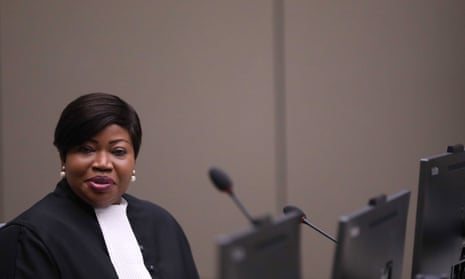The United States has lifted sanctions and a travel ban imposed by Donald Trump’s administration on the top prosecutor of the International Criminal Court, calling for a more cooperative relationship.
The former secretary of state Mike Pompeo last year imposed sanctions and refused visas for the outgoing prosecutor, Fatou Bensouda, after she launched an investigation into alleged war crimes by US military personnel in Afghanistan.
The court in The Hague further irritated the US by opening an investigation into alleged war crimes in the Palestinian territories by Israel, a US ally which rejects the authority of the court.
Pompeo’s successor, Antony Blinken, said the United States continued to “disagree strongly” with the moves.
“We believe, however, that our concerns about these cases would be better addressed through engagement with all stakeholders in the ICC process rather than through the imposition of sanctions,” Blinken said in a statement.
He said that both the sanctions and visa bans against Bensouda and her staff were being lifted.
“I trust this decision signals the start of a new phase of our common undertaking to fight against impunity” for war crimes, said Silvia Fernandez de Gurmendi, the head of the Association of States Parties to the ICC, in a statement.
The Gambian-born prosecutor is leaving her job in June and will be replaced by British human rights lawyer Karim Khan, who now can open his work without the burden of looming sanctions.
The US has not joined the ICC, which began operations in 2002 after enough countries ratified the treaty that created it, claiming that the court might be used for politically motivated prosecutions of American troops and officials.
But the removal of the sanctions was the latest signal that the Biden administration is intent on returning to the multilateral fold. The Trump administration had unapologetically removed the US from numerous international institutions and agreements and harshly criticized others, including the ICC, deeming them flawed and working against American interests.
Since Biden took office, his administration has rejoined the World Health Organization, re-engaged with the UN Human Rights Council, returned to the Paris climate accord and on Friday started talks aimed at returning to the Iran nuclear deal. Trump had pulled out of all five.
Rights groups on Friday applauded Biden for throwing out Trump’s sanctions but called for Biden to go further, by supporting the court’s work and making the US a member country.
Two sets of sanctions were imposed on Bensouda and the court’s head of jurisdiction, Phakiso Mochochoko, the first being a travel ban on Bensouda in March 2019, and then 18 months later a freeze on any assets she and Mochochoko may have in the US or US jurisdictions. The second round also made giving the pair “material support” a potentially sanctionable offense.
